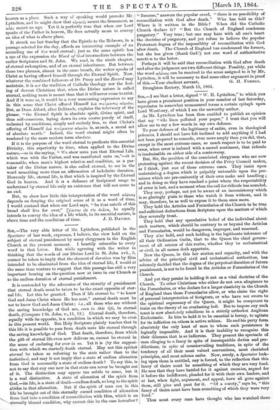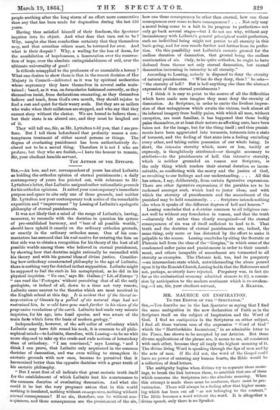Sts,—I see that a letter, signed " W. H. Lyttelton,"
to which you have given a prominent position in your number of last. Saturday, reprobates in somewhat unmeasured terms a certain epitaph upon Lord Westbury, of which I am the unworthy author.
As Mr. Lyttelton has been thus enabled to publish an opinion that my "vile lines polluted your paper," I trust that you will allow me to say a few words in my own defence.
To your defence of the legitimacy of satire, even in theological polemics, I should not have felt inclined to add anything if I had not been prepared to concede, even more amply than you did, that, except in the most extreme cases, so much respect is to be paid to error, when error is imbued with a sacred sentiment, that ridicule is inadmissible on either aide of a controversy.
But, Sir, the position of the associated clergymen who are now protesting against the recent decision of the Privy Council makes, as I think, just one of these extreme cases. They insist upon maintaining a dogma which is palpably untenable upon the pre- misses which are pre-eminently of their own make and handling ; and in doing so they have reached a point where the respectability of error is lost, and a moment when the call for ridicule has sounded.
They may, perhaps, not yet be aware of an inconsistency which is so glaringly plain to those who watch it from without, and it may, therefore, be as well to expose it to them once more.
They hold the Articles and Formularies of the Church to be true and sufficient deductions from Scripture upon the matters of which they severally treat.
They hold that any speculative belief of the individual about such matters, which should be contrary to or beyond the Articles and Formularies, would be dangerous, improper, and unsound.
They also hold, and such holding is the legitimate inference of all their Ordination Oaths, that to the Queen the chief govern- ment of all estates of this realm, whether they be ecclesiastical or civil, in all causes doth appertain.
Now the Queen, in this her station and capacity, and with the advice of the principal civil and ecclesiastical authorities, has solemnly decided that the dogma of the perpetual duration of future punishment, is not to be found in the Articles or Formularies of the Church.
And yet they persist in holding it out as a vital doctrine of the Church. To other Christians who either do not own allegiance to the Formularies, or who declare for a larger elasticity in the Church of England than those Formularies allow, or who claim the right of personal interpretation of Scripture, or who have not sworn to the spiritual supremacy of the Queen, it might be competent to insist on the theory of an everlasting hell. But to impose any such tenet is now absolutely rebellious in a strictly orthodox Anglican Ecclesiastic. In him to hold it to be essential is heresy, to agitate for its infliction on others is active schism. He and his party form absolutely the only knot of men to whom such persistence is logically impossible. And it is their inability to recognize this their dilemma that is so ludicrous. They present the spectacle of men clinging to a fancy in spite of incompatible duties and pre- dilections, in spite of countervailing traditions, in spite of the tendency of all their most valued conventions, most cherished principle% and most solemn oaths. Now, surely, a Spectator look- ing upon them is entitled, nay is forced, to the reflection that this fancy of theirs must be something of which they are very fond. He sees that they have battled for it against enemies, argued for it before the indifferent, pleaded for it with their own leaders, and at last, when fight, argument, and appeal, have all gone against them, still pine and pant for it. "Of a surety," says he, "this fancy of theirs must have been something of which they were very fond."
Thus must every man have thought who has watched these people seething after the long storm of an effort more consecutive than any that has been made for dogmatism during the last 150 years. Having thus satisfied himself of their fondness, the Spectator inquires into its object. And what does that turn out to be ? Why, naught else than comfortless certainty that they themselves may, and that countless others must, be tortured for ever. And what is their despair ? Why, a wailing for the loss of doom, for the annihilation of hopelessness, a lamentation over the resurrec- tion of hope, over the absolute extinguishableness of evil, over the ultimate universality of good !
Is ridicule misapplied to the professors of so unamiable a heresy ? What one desires to show them is that in the recent decision of Her Majesty in Council—delivered as it was by spiritual authorities whose supremacy they have themselves in several oaths main- tained ; based, as it was, on formularies fashioned correctly, as they themselves insist, from declarations emanating, as they themselves believe and teach, from God's own mouth, they should rejoice to find a rest and quiet for their weary souls. But they are as millers who wake when their millstones are stopped, and who say that they cannot sleep without the clatter. We are bound to believe them ; but their state is an absurd one, and they must be laughed out of it.
They will tell me, Sir, as Mr. Lyttelton told you, that I am pro- fane. But I tell them beforehand that profanity means a con- temptuous treatment of either sacred persons or things. The dogma of everlasting punishment has been authoritatively de- clared not to be a sacred thing. Therefore it is not I who am profane, but they who are foolish,—I have the honour to remain, Sir, your obedient humble servant,
THE AUTHOR OF THE EPITAPH..



































 Previous page
Previous page